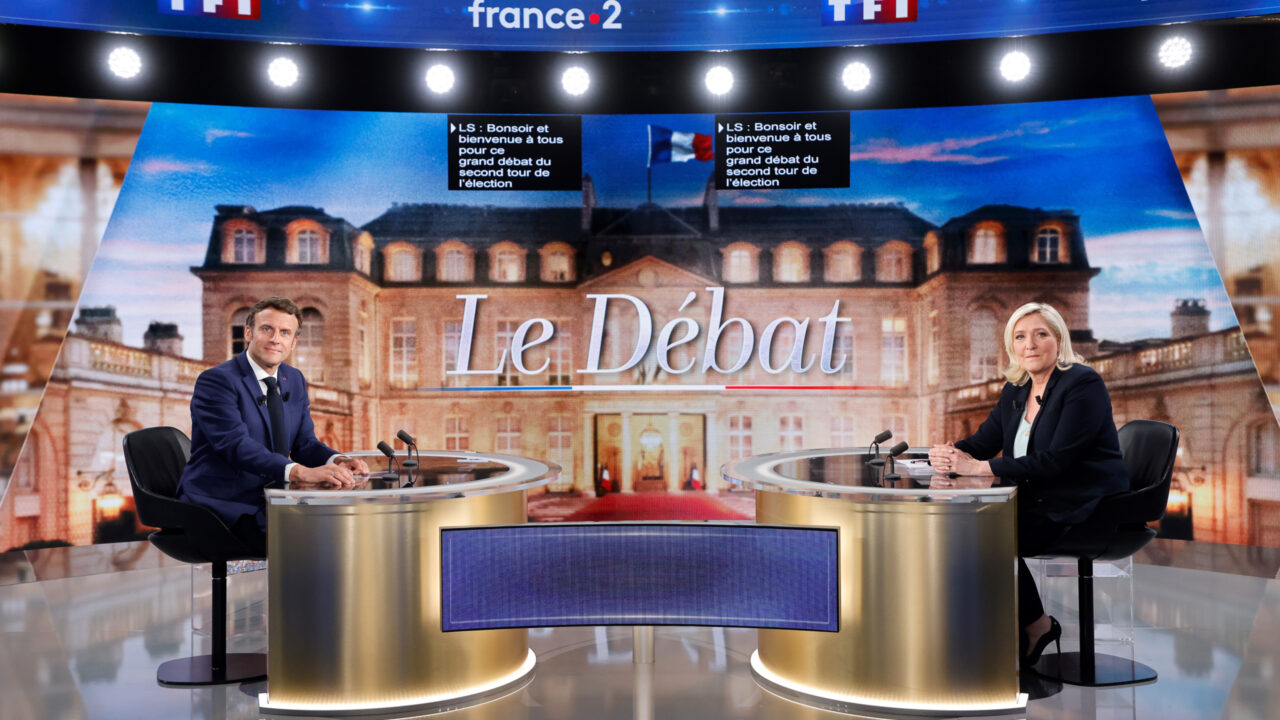Rollercoaster vote: Europe’s future after the French presidential election
A recent TV debate highlighted the ways in which the French presidential election could reshape European politics. A win for Marine Le Pen would pose a terrible threat to France, the EU, and the West
On 20 April, Emmanuel Macron and Marine Le Pen participated in a much-anticipated TV debate as part of their campaigns for the second round of the French presidential election. Prior to the first round on 10 April, Russia’s war on Ukraine had dominated the presidential race, which usually revolves around domestic issues. The exchange between Macron and Le Pen lasted more than two hours and covered everything from purchasing power, Europe, and foreign affairs to public services, climate change, and energy security.
On paper, the contest between the candidates appears to be merely a rerun of the 2017 vote. However, the situation is different this time around. Polls indicate Macron will become the first French president in 20 years to be re-elected. But his margin of victory is projected to be 10 percentage points smaller than it was in 2017. And, unlike in the previous election, he is now the subject of significant public anger, mistrust, and defiance.
As for Le Pen, she needed to prove that she had learnt from her collapse during the 2017 debate. Accordingly, she halted all campaign events for two days before the debate to prepare for her TV appearance. Le Pen succeeded in not collapsing. She was more composed and controlled than last time but, ultimately, Macron was better than her at clarifying technical points, as a poll published last night seemed to confirm. Interestingly, the bar was quite low for her and relatively high for him, as he needed to defend his track record and prove that he was still the best person to take on the job for the next five years.
Jean-Luc Mélenchon came close to beating Le Pen in the first round, winning 21.95 per cent of the vote to her 23.15 per cent. Therefore, the far-left leader has become the kingmaker of the second round. Many of Mélenchon’s supporters distrust Macron so profoundly that they are reluctant to vote for him in the second round. This is despite the fact that the far-left leader stated in his concession speech on 10 April that “not even one vote from La France Insoumise [his party] should go to Marine Le Pen”. Some of Mélenchon’s supporters even claim that they see no difference between Macron and Le Pen. According to a survey conducted by La France Insoumise, 37.65 per cent of people who voted for the party plan to submit a blank vote in the second round, while 28.96 per cent favour abstention and 33.40 per cent a vote for Macron. Yet it is impossible to predict how they will cast their votes on 24 April.
Partly due to the political reconfiguration Macron helped initiate in 2017 by founding La République en Marche, the centre-left Parti Socialiste and the right-wing Les Républicains have collapsed. Today, the French political landscape is organised around a large centre-ground in Macron, the far left in Mélenchon, and the far right in Le Pen and Éric Zemmour.
For both Macron and Le Pen, the challenge now lies in appealing to Mélenchon’s supporters. To remain president, Macron will need to be more vocal on issues such as hospitals, schools, pensions, climate change, and women’s rights. Le Pen, for her part, addressed Mélenchon’s supporters immediately after the first-round results came in. And she has since directed most of her public announcements at them. For example, during the debate, she mentioned the hardships experienced by single parents, farmers, workers, vulnerable people, and others who feel hurt by Macron as “president of the elite”.
There are two issues on which the divergence between Macron and Le Pen is especially clear: Europe and foreign policy. Their reputations as pro- and anti-EU understate the differences between them. In the past five years, Macron has consistently tried to make the European Union stronger economically, defensively, and normatively. He has attempted to increase the union’s geopolitical ambitions in an increasingly competitive environment.
Le Pen has vowed to form an alliance with Orban and, in office, would likely extend this to Russian President Vladimir Putin
Le Pen has abandoned the idea of a French withdrawal from the EU (as she proposed in 2017) but has now adopted the rhetoric and strategies of illiberal leaders such as Hungarian Prime Minister Viktor Orban. She calls for France to stay in the EU and transform it from the inside. She aims to create a union of the bare minimum, and to incrementally destroy even this. Le Pen has vowed to form an alliance with Orban and, in office, would likely extend this to Russian President Vladimir Putin. Such an alliance would bring an end to the unprecedented cohesion and unity the West has shown in helping Ukraine fight back against Russia. Her foreign policy would pose a terrible threat to France and the EU: she would turn away from the Franco-German alliance and would replace the primacy of EU law with the primacy of French law, in violation of EU treaties.
As shown by an ECFR study published in March 2022, Europeans have generally trusted France to be the EU’s diplomatic leader. Once the French presidential election is over, whoever wins will have to take on this role. But they should do so in a more inclusive manner – by increasing the EU’s ambitions of self-empowerment, by consulting with allies and partners, and by developing more instruments of geopolitical power. In this sense, the French presidential election will shape the future of Europe.
The European Council on Foreign Relations does not take collective positions. ECFR publications only represent the views of their individual authors.



